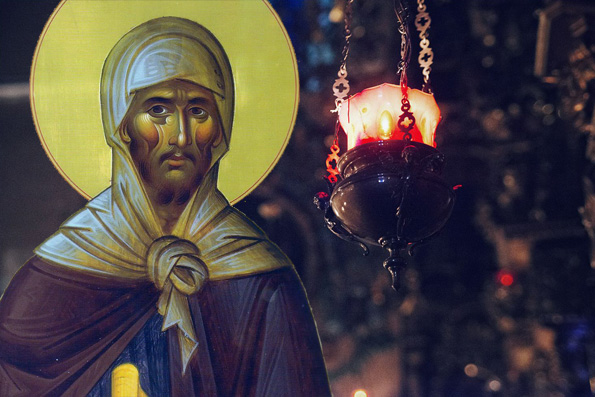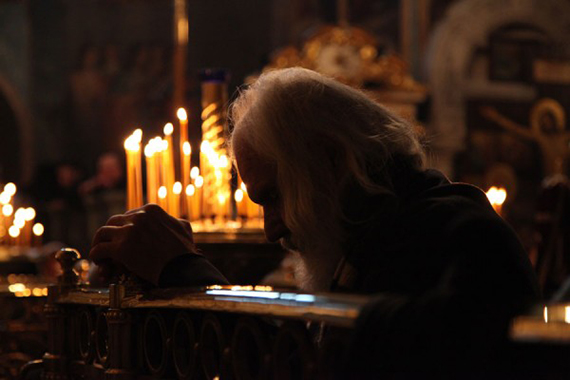
During the Great Lent in all the churches, one of the oldest penitential prayers, written by St. Ephraim the Syrian (Syriac) in the distant 4th century, has been read many times during the service, but has not lost its relevance to our time.
Here is the text of this prayer:
Lord and Master of my belly, Do not give me the spirit of idleness, despondency, lust control and idle talk.
The spirit of chastity, humility, patience and love grant me, Your servant.
She, Lord, King! Grant me to see my trespasses, and do not judge my brother. For thou art blessed unto the ages of ages. Amen.
To the petitions of this prayer is supposed to do 4 earthly and 12 belt bows. Why does such a short and simple prayer take such an important place in the Lenten worship? Why is it so loved by the clergy and believers?
Famous theologian of the twentieth century Fr. Alexander Schmemann gives such an answer to these questions: it lists all the negative and positive elements of repentance peculiar to this prayer, and determines, so to speak, the list of our individual feats. The goal of these feats, first of all, is liberation from some basic ailment that guides our whole life and prevents us from entering the path of conversion to God.
Such a major ailment for many of us is idleness. What is idleness ? This is not just laziness, but a peculiar passivity of our entire state of mind, when the heart is filled with the thought of impossibility and unwillingness to change anything. Idleness is a very dangerous sin, for good reason the saint begins his prayer with him, because the idle state of a person is the cause of the majority of sins, including dejection.
Discouragement is not just pessimism in matters of salvation, it is despair and a true suicide for the soul, which in despondency does not aspire to anything else. Many saints were tempted to be tempted by this sin, but they overcame it, thanks to a fervent prayer for God, which serves as a cure for despondency. 
Lubovinachalie - this is the desire for primacy, which is the fruit of idleness and despondency. When a person does not take anything anymore, then, turning away from God, he strives to satisfy his ego. Lubovinachalie is not always a desire to command and be the whole head. Often it manifests itself in contempt and indifference to the people around whom an original person begins to consider as his servant. When these three passions take hold of a person, they begin to manifest themselves externally, through the passion of idle talk, when the whole mess of the soul splashes out on the people in a verbal form.
Repeating the first request of prayer, we, together with St. Ephraim, we ask God to save us from all these symptoms of sin, which as a disease takes possession of the human soul. At the same time, repentance is directed against these passions, to which each of us is called. Therefore, in the next petition of prayer, we ask the Lord for those virtues that are antonymic to sins, from which we ask us to protect.
Chastity - the integrity of all thoughts and actions aimed at spiritual growth, which acts in opposition to idleness. Humility is the sound wisdom of modesty and humility, which is impossible for a dull person. Patience is a virtue inherent in God, reflecting a careful and respectful attitude towards man and his weaknesses. And finally, the crown of these virtues is love, which is given to us from God, which never ceases. The great gift of love is the ultimate goal of all spiritual experience.
In the last petition of the prayer of Ephraim the Syrian, we ask the gift to see our sins and not to condemn for the mistakes of others. Each of us can catch himself in that it is easy and pleasant for him to spend hours discussing others, their misdeeds and passions. Tangles of gossip at work, kitchen political battles, new episodes of savvy wars on the Internet - it all so densely entered our life, that behind an array of surrounding knots, we do not notice our logs. And after all, the spiritual development, and the surrounding welfare of the outside world begins with each of us. To escape from this cycle of ordinary sinfulness, we need and is useful the shake-up, which is the time of Lent.
In this beautiful period to renew the spirit, everyone should look inside, think about their sins - and turn to God with repentance. The prayer of St. Ephraim the Syrian, and the useful experience of the Church, which in our time continues to bear the call of His Head, the Lord Jesus Christ, calls us to this: Repent, for the Kingdom of Heaven is approaching (Matthew 4:17).




